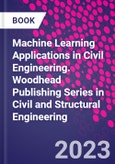Machine Learning Applications in Civil Engineering discusses machine learning and deep learning models for different civil engineering applications. These models work for stochastic methods wherein internal processing is done using randomized prototypes. The book explains various machine learning model designs that will assist researchers to design multi domain systems with maximum efficiency. It introduces Machine Learning and its applications to different Civil Engineering tasks, including Basic Machine Learning Models for data pre-processing, models for data representation, classification models for Civil Engineering Applications, Bioinspired Computing models for Civil Engineering, and their case studies.
Using this book, civil engineering students and researchers can deep dive into Machine Learning, and identify various solutions to practical Civil Engineering tasks.
Please Note: This is an On Demand product, delivery may take up to 11 working days after payment has been received.
Table of Contents
1. Introduction to Machine Learning for Civil EngineeringWhat is Machine Learning (ML), how it can be used to solve General Purpose tasks, Optimization System Design, use of ML for different Civil Engineering Areas
2. Basic Machine Learning Models for data pre-processing
Data sources in Civil Engineering Applications, including images, on-field data, drone data, IS codes, and audio datasets. Introduction to ML based pre-processing models like ARIMA, Wavelet, Fourier, etc. to filter these signals, Use of filtered signals for solving real-time Civil Engineering tasks
3. Use of ML models for data representation
What is Data Representation w.r.t. Civil Engineering, different ML methods for representing data that can be used for classification & post-processing applications.
4. Introduction to classification models for Civil Engineering Applications
What is classification, and how it can be used to optimize Civil Engineering Applications, use cases for Geotechnical Engineering, Structural Engineering, Water Resources Engineering, Environmental, and Remote sensing GIS applications
5. Classification Models for practical deployment in different Civil Engineering Applications
Introduction to kNN, Random Forests, Na�ve Bayes, Logistic Regression, Multiple Layered Perceptron, and Fuzzy Logic models for classification, as applied to real time applications
6. Advanced Classification Models for different Civil Engineering Applications
Introduction to Convolutional Neural Networks (CNNs), advantages of CNNs over traditional methods, issues with CNNs when applied to Civil Engineering tasks, applications of CNNs for different fields of Civil Engineering
7. Advanced Classification Models II: Extensions to CNNs
Introduction to Recurrent Neural Networks (RNNs), Long-Short-Term Memory (LSTM), Gated Recurrent Units (GRUs), and their real-time applications to Civil Engineering tasks, sample GIS application and its solutions with different deep learning models
8. Bioinspired Computing models for Civil Engineering
Introduction to bioinspired computing, role of optimization in Civil Engineering, different bioinspired models, and their applications to solving traffic issues
9. Reinforcement Learning Methods & role of IoT in Civil Engineering Applications
What is reinforcement learning, introduction to IoT for Civil Engineering, use of reinforcement learning for low-power IoT-based Civil Engineering Applications
10. Solution to real time Civil Engineering tasks via ML
Case Study 1: Use of drones for construction monitoring, and their management via ML
Case Study 2: Conservation of water resources via bioinspired optimizations
Case Study 3: Reduction of Green House effect via use of recommendation models
11 Regression-based models in civil engineering
12 Application of ML in 3D Building Information Modelling (BIM)
13 Structural health monitoring system
14 Structural design and analysis








